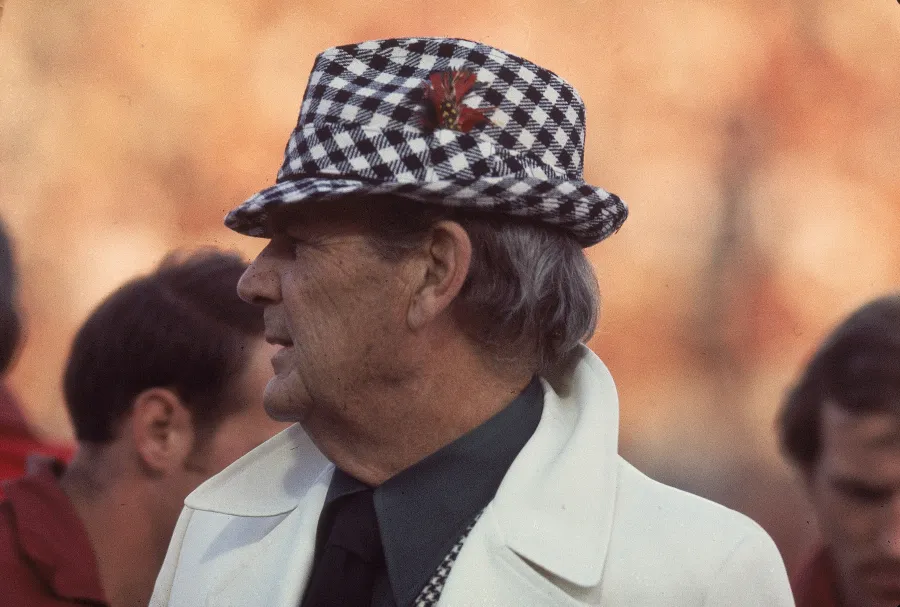Bear Bryant, who served as the head coach of the University of Alabama’s storied football program from 1958 to 1982, is universally recognized as one of the greatest coaches in the history of college football. Revered not just in the state of Alabama but across the entire nation, Bryant’s impact on the game, on the young men he mentored, and on the culture of college athletics remains monumental decades after his final game on the sidelines. His legacy is built not only on his extraordinary win-loss record but also on the character, toughness, and timeless standard of excellence he instilled in every facet of the Crimson Tide program.
Paul William “Bear” Bryant was more than just a coach. He was a cultural icon, a symbol of the hard-nosed, disciplined, and relentless pursuit of greatness that came to define Alabama football. Born on September 11, 1913, in Kingsland, Arkansas, Bryant earned his famous nickname “Bear” at the age of 13 after wrestling a captive bear at a carnival for a few dollars. It was a fitting origin story for a man whose life would come to be associated with toughness, resilience, and determination.
Before his tenure at Alabama, Bryant had already made a name for himself as a coach at Maryland, Kentucky, and Texas A&M. At Texas A&M, he famously took his team to a grueling training camp in Junction, Texas—a brutal test of endurance and discipline that has become legendary in coaching lore. But it was at Alabama that Bryant would truly cement his place among the immortals of the sport.
When he took over the Crimson Tide in 1958, the program was in a downward spiral. Alabama had gone 4–24–2 over the three seasons before his arrival, and morale was low among fans and players alike. Bryant, an Alabama alum himself who had played for the Tide in the 1930s under coach Frank Thomas, knew what it meant to wear the crimson and white. His return to Tuscaloosa was met with great anticipation, and he did not disappoint. In just his second season, he led Alabama to a 7–2–2 record and an invitation to the Liberty Bowl. By 1961, the Crimson Tide were undefeated national champions, marking the beginning of a dynasty.
Over the next two decades, Bear Bryant’s Alabama teams became synonymous with dominance. He led the Crimson Tide to six national championships—1961, 1964, 1965, 1973, 1978, and 1979—and thirteen Southeastern Conference (SEC) titles. He coached 14 seasons with ten or more wins, a remarkable feat in an era with shorter schedules and fewer bowl games. His career record at Alabama was a staggering 232–46–9, and his overall coaching record stood at 323–85–17 at the time of his retirement, making him the winningest coach in college football history when he stepped away from the game.
Bryant’s success wasn’t just about numbers. It was about the way he built his teams—his famous “wishbone” offense, his stifling defenses, his demand for physical and mental toughness, and his unshakable commitment to team over self. His players revered him, not because he coddled them, but because he challenged them. He pushed them to the brink, then pulled them together with an unbreakable bond. Many of his former players went on to become coaches, executives, and leaders, carrying with them the lessons they learned from “The Bear.”
Perhaps most telling of Bryant’s approach to leadership was his ability to adapt. As the social and cultural landscape of the South began to change in the 1960s and 70s, Bryant was at the helm of one of the most visible institutions in the region. He is often credited with playing a significant role in integrating college football in the South. While Alabama was slower to integrate than some northern programs, Bryant was strategic and deliberate, knowing that public sentiment and political forces in Alabama presented unique challenges. Yet he made it clear to university officials and fans that he wanted to recruit Black players. When Wilbur Jackson joined the Crimson Tide in 1970 as its first African American scholarship athlete, and when John Mitchell became the first to start in a game, it signaled a new era. Bryant’s decision to schedule a 1970 game against USC—a game in which USC’s all-Black backfield ran over an all-white Alabama team—has long been viewed as a pivotal moment that helped accelerate integration at Alabama and other SEC schools.
Bryant also knew how to evolve on the field. While many coaches became rigid in their philosophies, he was always looking for a competitive edge. Whether it was shifting from a pro-style offense to the wishbone or making bold decisions in critical moments, Bryant was ahead of his time. His teams were known for their versatility, grit, and ability to execute under pressure.
Off the field, Bryant was a figure larger than life. With his trademark houndstooth hat and deep Southern drawl, he became one of the most recognizable figures in American sports. He was the subject of books, documentaries, and countless stories passed down from generation to generation. He was deeply respected by his coaching peers and beloved by Alabama fans in a way that transcended sport. In Alabama, he wasn’t just a football coach—he was a living legend.
His influence extended beyond the game itself. He was known for his loyalty, his humility, and his ability to inspire. Despite all his success, Bryant remained grounded. He once famously said, “If you believe in yourself and have dedication and pride—and never quit—you’ll be a winner. The price of victory is high but so are the rewards.” Those words captured his essence—not just as a coach, but as a leader of men.
Bear Bryant coached his final game on December 29, 1982, in the Liberty Bowl against Illinois, a 21–15 victory that gave him his 323rd career win. Just weeks later, on January 26, 1983, he passed away from a heart attack at the age of 69. His death shook the college football world to its core. Over a quarter of a million people lined the streets of Birmingham to watch his funeral procession, a testament to the impact he had on so many lives.
In the years since his passing, Bryant’s legacy has only grown. The University of Alabama’s football complex is named the Paul W. Bryant Hall. A museum dedicated to his life and career sits on the Tuscaloosa campus, drawing thousands of visitors each year. The Paul “Bear” Bryant Award, presented annually to the nation’s top college football coach, ensures that his name remains synonymous with excellence in coaching.



